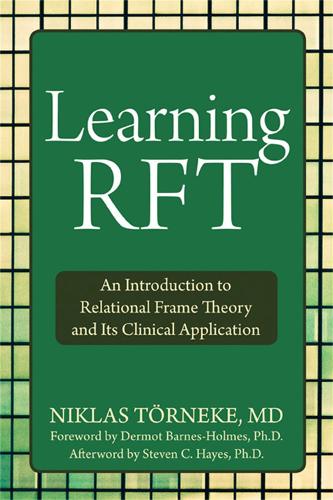
Learning RFT: An Introduction to Relational Frame Theory and Its Clinical Applications
(Paperback)
Publishing Details
Learning RFT: An Introduction to Relational Frame Theory and Its Clinical Applications
By (Author) Dr. Niklas Trneke
New Harbinger Publications
New Harbinger Publications
4th November 2010
United States
Classifications
General
Non Fiction
616.891425
Physical Properties
Paperback
267
Width 152mm, Height 228mm, Spine 18mm
411g
Description
Relational frame theory, or RFT, is the little-understood behavioral theory behind a recent development in modern psychology: the shift from the cognitive paradigm underpinning cognitive behavioral therapy to a new understanding of language and cognition. Learning RFT presents a basic yet comprehensive introduction to this fascinating theory, which forms the basis of acceptance and commitment therapy. The book also offers practical guidance for directly applying it in clinical work. In the book, author Niklas Toerneke presents the building blocks of RFT: language as a particular kind of relating, derived stimulus relations, and transformation of stimulus functions. He then shows how these concepts are essential to understanding acceptance and commitment therapy and other therapeutic models. Learning RFT shows how to use experiential exercises and metaphors in psychological treatment and explains how they can help your clients. This book belongs on the bookshelves of psychologists, psychotherapists, students, and others seeking to deepen their understanding of psychological treatment from a behavioral perspective.
Reviews
"At times, while reading Trneke's book, I have felt as though I were in the middle of a thriller about the psychopathological behaviors of humans. Clues to unraveling the mystery embedded in complex concepts like 'arbitrarily applicable relational responding' have alerted me, as the reader, to what is coming up next. Our ability for relational framing and for rule-governed behavior may at first glance seem fabulous--a gift from the gods--but darkness lurks around the corner. Our ability to problem-solve is the villain. This book helps me make sense of it all."
--Maria Midbe, M.Sc., candidate in psychology at Stockholm University in Stockholm, Sweden
"For years, clinicians have asked me for recommendations about what they should read to learn RFT. There was really no good advice I could give except 'be persistent.' Finally, I have a better answer. If you want to understand relational frame theory, this is the place to start. Trneke's RFT primer is both masterful and accessible."
--Kelly G. Wilson, PhD, associate professor of psychology at the University of Mississippi, coauthor of Acceptance and Commitment Therapy and author of Mindfulness for Two
"Since RFT first appeared in the experimental literature, it has been hailed as a breakthrough in our scientific understanding of language and cognition with direct and important implications for clinical psychological practice. Yet, descriptions of RFT, written largely for technical audiences, have been, at best, curiously baffling, and at worst, maddeningly incomprehensible. In this book, Trneke has solved the puzzle of RFT! He summarizes the history of RFT, its key features, and its clinical implications with language that is user-friendly and easily understandable. I believe this book will make a huge difference for clinicians who wish to understand RFT and its implications for clinical practice. It also may be a useful learning tool for researchers and RFT experts themselves who wish to learn and see a beautiful example of how RFT can be presented clearly and comprehensively."
--Jonathan Kanter, associate professor at the University of Wisconsin-Milwaukee and director of its Depression Treatment Specialty Clinic
"There is no better place to start learning about RFT than this excellent book. Trneke teaches the principles of RFT simply and elegantly, using a wealth of clinical examples to make it accessible and stimulating. I wish a book like this had existed when I first learned about RFT; it would have saved me many hours of hard work, frustration, and confusion."
--Russ Harris, author of The Happiness Trap and ACT Made Simple
"Until now, explanations of relational frame theory have remained largely esoteric and even impenetrable to all but the most specialized scholars. For the first time, this extraordinary book provides a highly accessible account of relational frame theory, including its larger context within psychology, the current research in the field, and its many potential applications. Trneke strikes a fine balance between doing justice to relational frame theory and making the theory, research, and its implications readily comprehensible to the non-expert. This unique book is a must-read for scholars of human cognition, as well as clinicians, educators, others seeking to harness the power of basic psychological principles in their applied work, and anyone interested in the renaissance of modern behavior analysis."
--James D. Herbert, PhD, professor of psychology at Drexel University in Philadelphia, PA, and director of Anxiety Treatment and Research
"On rare occasions, the skills of writer, therapist, and theorist combine to give the field a sophisticated yet highly practical book. This much-awaited translation shows relational frame theory as an accessible, powerful tool for all who use talk therapy. A must-read for those interested in contemporary behaviorism."
--Kelly Koerner, PhD, creative director at Evidence Based Practice Institute in Seattle, WA
Author Bio
Niklas Trneke, MD, is a psychiatrist and has worked as a senior psychiatrist in the department of general psychiatry in his hometown Kalmar (in the southeast of Sweden) from 1991 until he started private practice 1998. He earned license as a psychotherapist in 1996 and was originally trained as a cognitive therapist. Since 1998 he has worked mainly with acceptance and commitment therapy, both in his own practice and as a teacher and clinical supervisor. His clinical experience ranges from psychiatric disorders such as schizophrenia to common anxiety and mood disorders with high prevalence in the general population.
